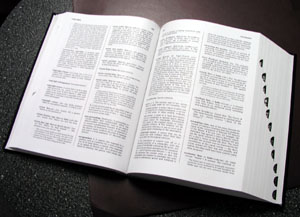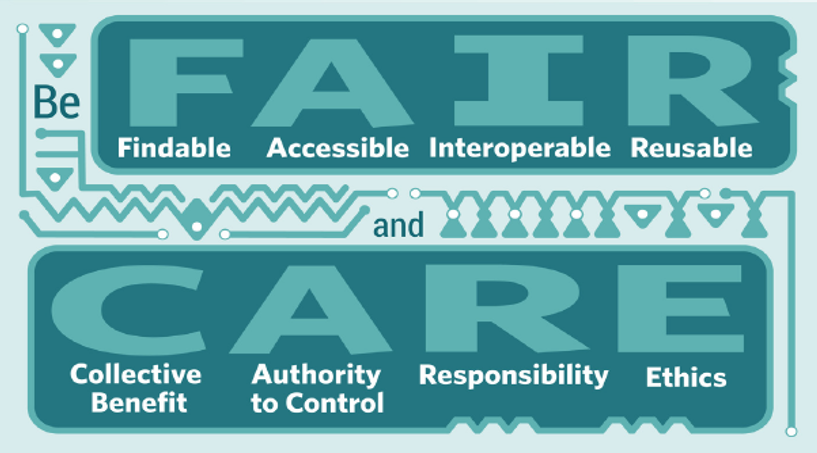
This glossary was created and/or compiled from the participants of the OpenAIRE train-the-trainer bootcamps
Special | A | B | C | D | E | F | G | H | I | J | K | L | M | N | O | P | Q | R | S | T | U | V | W | X | Y | Z | ALL
C |
|---|
CARE PrinciplesDefinition: The CARE (Collective benefit, Authority to control, Responsibility, Ethics) Principles for Indigenous Data Governance are people and
purpose-oriented, reflecting the crucial role of data in advancing
Indigenous innovation and self-determination. These principles
complement the existing FAIR principles encouraging open and other data
movements to consider both people and purpose in their advocacy and
pursuits. Collective benefit The current movement toward open data and open science does not fully engage with Indigenous Peoples’ rights and interests. Existing principles within the open data movement primarily focus on characteristics of data that will facilitate increased data sharing among entities while ignoring power differentials and historical contexts. The emphasis on greater data sharing alone creates a tension for Indigenous Peoples who are also asserting greater control over the application and use of Indigenous data and Indigenous Knowledge for collective benefit. This includes the right to create value from Indigenous data in ways that are grounded in Indigenous worldviews and realise opportunities within the knowledge economy. Related terms: FAIR Principles Found in: "CARE Principles for Indigenous Data Governance". https://www.gida-global.org/care References: Research Data Alliance International Indigenous Data Sovereignty Interest Group (2019). "CARE Principles for Indigenous Data Governance". The Global Indigenous Data Alliance. GIDA-global.org *** CARE Principles for Indigenous Data Governance"The current movement toward open data and open science does not fully engage with Indigenous Peoples rights and interests. Existing principles within the open data movement (e.g. FAIR: findable, accessible, interoperable, reusable) primarily focus on characteristics of data that will facilitate increased data sharing among entities while ignoring power differentials and historical contexts. The emphasis on greater data sharing alone creates a tension for Indigenous Peoples who are also asserting greater control over the application and use of Indigenous data and Indigenous Knowledge for collective benefit.This includes the right to create value from Indigenous data in ways that are grounded in Indigenous worldviews and realise opportunities within the knowledge economy. The CARE Principles for Indigenous Data Governance are people and purpose-oriented, reflecting the crucial role of data in advancing Indigenous innovation and self-determination. These principles complement the existing FAIR principles encouraging open and other data movements to consider both people and purpose in their advocacy and pursuits." Reference: Research Data Alliance International Indigenous Data Sovereignty Interest Group. (September 2019). “CARE Principles for Indigenous Data Governance.” The Global Indigenous Data Alliance. GIDA-global.org | |
Citizen ScienceThe European Citizen Science Association describes citizen science as follows: "Citizen science is an ‘umbrella’ term that describes a variety of ways in which the public participate in science. The main characteristics are that: (1) citizens are actively involved in research, in partnership or collaboration with scientists or professionals; and (2) there is a genuine outcome, such as new scientific knowledge, conservation action or policy change. (...) Citizen science takes place in diverse fields, including ecology, astronomy, medicine, computer science, history – and many more. And citizen science can happen at a range of different scales – from local projects to continental and global scales, and from short projects to those that occur over decades!" ECSA "Characteristics of Citizen Science" | ||
Civic EngagementCivic engagement refers to the active involvement of people in the life of their communities in order to provide solutions to social problems, improve conditions and so positively affect the future and prosperity of their community. Civic engagement is a term that remains open to various interpretations depending on the context it refers to. Overall, civic engagement is deemed a significant characteristic of a community whose members feel connected with each other and realize the importance of being actively engaged for the benefit of their community. In this context, the level of engagement varies depending on several factors, such as the distribution of power, the degree of social justice and the representativeness of people in the political arena. Alternative definition: public engagement, public participation, active citizenship References: Adler, R. P., & Goggin, J. (2005), Glas, N., Pelachaud, C. (2015). Ekman, J., Amnå, E. (2012). | ||
Controlled vocabulariesControlled vocabulary is an organised and standardised arrangement of predefined terms (words and phrases) that are used to index content in an information system with the aim of facilitating information retrieval. Controlled vocabularies provide a consistent way to describe data. They are standardized and organized arrangements of words and phrases presented as alphabetical lists of terms or as thesauri, ontologies, and taxonomies with a hierarchical structure of broader and narrower terms. Controlled vocabularies also connect variant terms and synonyms for concepts, link concepts in a logical order and organise them into categories. They can be general and discipline-specific. Using a controlled vocabulary will aid in searching and finding your data and will make your data more shareable with researchers in the same discipline. Ontologies are not controlled vocabularies, but they use controlled vocabularies to establish a formal specification of a conceptual model in which concepts and categories of concepts, properties, relationships among concepts and categories, functions, constraints, and axioms are defined. Registries of controlled vocabularies: Sources: https://op.europa.eu/en/web/eu-vocabularies/controlled-vocabularies ; https://guides.lib.unc.edu/metadata/controlled-vocab, https://www.openaire.eu/how-to-comply-with-horizon-europe-mandate-for-rdm (Glossary) | ||
CopyrightCopyright (or author’s right) is a legal term used to describe the rights that creators have over their literary and artistic works. Works covered by copyright range from books, music, paintings, sculpture, and films, to computer programs, databases, advertisements, maps, and technical drawings. source: WORLD INTELLECTUAL PROPERTY ORGANIZATION | ||
Creative Commons licensesCreative Commons licenses give everyone from individual creators to large institutions a standardized way to grant the public permission to use their creative work under copyright law. From the reuser’s perspective, the presence of a Creative Commons license on a copyrighted work answers the question, “What can I do with this work?” There are six different license types:
CC0 (aka CC Zero) is a public dedication tool, which allows creators to give up their copyright and put their works into the worldwide public domain.
References: | ||

